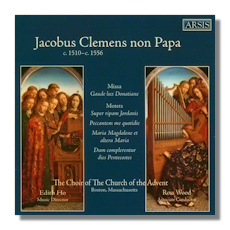
The Internet's Premier Classical Music Source
Related Links
- Clemens non Papa Reviews
- Latest Reviews
- More Reviews
-
By Composer
-
Collections
DVD & Blu-ray
Books
Concert Reviews
Articles/Interviews
Software
Audio
Search Amazon
Recommended Links
Site News
 CD Review
CD Review
Jacobus Clemens non Papa

- Missa Gaude lux Donatiane
- Motet "Super ripam Jordanis"
- Motet "Peccantem me quotidie"
- Motet "Maria Magdalene et altera maria"
- Motet "Dum complerentur dies Pentecostes"
The Choir of the Church of the Advent, Boston/Edith Ho
Arsis CD160
This is sublime music and exceptionally beautiful. The Missa, Gaude lux Donatiane in particular is bright, translucent and in every way uplifting. It would, however, be possible to deprive it of its buoyancy by rendering the sounds frothy, the lines either hurried or ponderous. For all its internal strength and structure, it's music that needs insightful phrasing, careful approach to texture and rigorous control of tempi. Then it breathes; it draws all its power from the resulting space; and that gentle might makes a marvelous impact on the listener.
Such insight, care and authority are the hallmarks of The Choir of the Church of the Advent, Boston. They offer over an hour's performance on this highly recommendable CD which exhibits all these characteristics. But their style is also a relaxed one: the Choir obviously enjoys the music. They avoid any hint of either such dilutions or forced deviations from what works. Their articulation is faultless – listen to the end of the dona nobis pacem in the "Agnus Dei" of the Mass, for example.
Similarly the motet, Dum complerentur dies Pentecostes, motet could lose its impact by too busy, too fussy even, a mere passage through the melodic lines. Instead, The Choir of the Church of the Advent keeps its collective nerve: the sounds are clear and transparent without being aggressively pointed or painted – fresh and clean without sounding over punctilious. The exacting standards which the Choir sets make the less well known Clemens non Papa more welcome at the high table of Renaissance polyphony than many an infrequent visitor can expect. For there is a tempered enthusiasm and attachment to the music on the part of Ho and her singers that achieves just the right proportions of forward movement and modest consideration.
Clemens non Papa (surely one of the more interesting composers' names) was probably born Jacob, or Jacques Clement. We do not know for certain the year of his birth. The earliest work that can safely be attributed to him dates from 1536, when he was likely to have been in his twenties. Pope Clement VII had died two years earlier and it's assumed that the nickname "non Papa" is a semi-humorous way of distinguishing the priest composer from that pontiff. In the later years of what was a short life anyway, Clemens not only probably became less productive (a state possibly attendant on a reckless and/or dissolute lifestyle); but also fewer works that he may have written actually survive. Circumstantial evidence suggests he was dead by 1556 – surely at no more than 50. He lived and worked in Flanders for most of his life.
Misattributions of his work (usually to Crecquillon and Manchicourt) aside, Clemens is known to have written 15 masses, two sets of eight Magnificats, 80 chansons and a dozen or so psalms. But he is best known these days for the over two hundred motets – published mostly after his death, and four of which complete this disc. Like the Mass, they date from the 1540s. Of these, three, Peccantem me quotidie, Maria Magdalene et altera maria and Dum complerentur dies Pentecostes are "responsory" motets… a soloist (priest or cantor) is answered by the congregation. Again, The Choir of the Church of the Advent strikes a perfect balance between expressing the inherent drama in this form, and respecting the liturgical solemnity of the words.
Since the motets also convey their meaning, make their impact, through structure as well as through texts which must both be heard clearly, the Choir has to build its interpretation on familiarity as much with the idiom as with the particular setting. Once again, these sixteen or so singers have a style and confidence that render the music as powerfully as is appropriate to the length and gravity of each work. So these are exemplary accounts because they're both full of life and vigor and duly sensitive.
The acoustic (of the Choir's own church in Boston) is one we have become used to on other of this distinguished body's CDs. It's neither too dry, restricted; nor too roomy, and this is well suited to the music. The booklet contains useful background material and the texts in Latin and English complete what is a more than merely satisfying – an invigorating and inspiring – experience. If this repertoire interests you even tangentially, this is a CD not to be missed.
Copyright © 2009, Mark Sealey



















